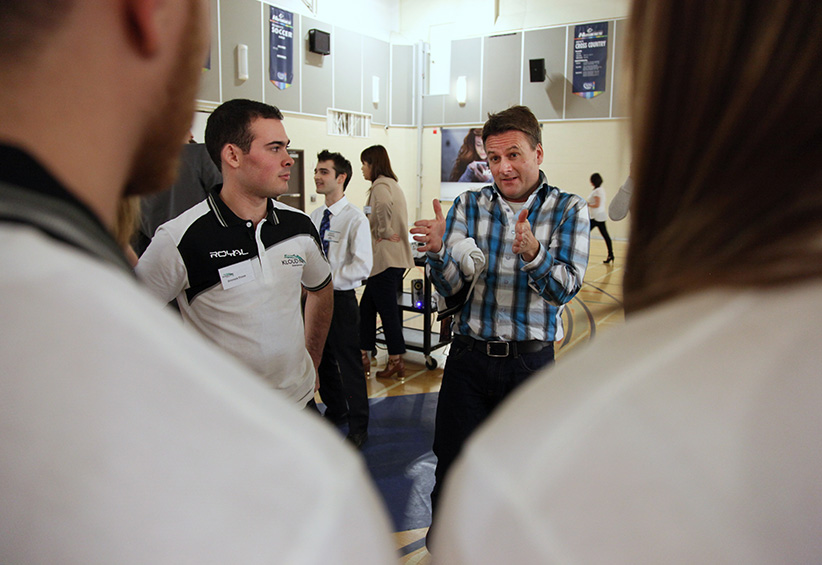New breed of entrepreneurial profs teaches students to learn by doing
Forget the business-school lecture. These profs learn by doing and encourage their students to do the same.
Peter Widdis, a professor in the Centre for Business, Arts and Design gives advice to Stephen Tyson and his team called Kloud Nine Entertainment, a group of students presenting to a panel of industry professionals at the George Brown Exam Jam. (Anne-Marie Jackson/Toronto Star/Getty Images)
Share

Three years ago, after 20,000 km atop her motorcycle, Calgary rider Patti Derbyshire let her aches and pains inspire her. “I started wondering why motorcycles are built for men and not women,” she says. “But I was sure someone had to be doing this—measuring women to develop seat and grip differentiations.” This is where most lofty ideas had by regular folk end, but Derbyshire has a very helpful day job: chair and associate professor of entrepreneurism, marketing and social innovation at Mount Royal University’s Bissett School of Business.
For almost two decades, Derbyshire has been teaching entrepreneurship—an elusive skill, often seen as a character trait or even a “spirit” that you either have or do not have. Just a few decades ago, academics weren’t even sure entrepreneurship could be taught, and if so, where it should fall within university curricula. “Some believed it didn’t even belong in business school, it belonged in the faculty of art.”
That’s because being an entrepreneur isn’t like becoming a dentist or an engineer or just about anything else. Every business is unique, as is every business owner, and although schools across North America have expanded in recent years to include entrepreneurship, the truth is most entrepreneurs still learn the hard way. “Most of us have learned by doing,” explains George Brown College marketing professor Peter Widdis. “We’re usually thrown into the deep end of the pool and learn by necessity.”
Like Derbyshire, Widdis is part of a new breed of hybrid profs he’s called (and trademarked, naturally) profpreneurs. “I’m half professor and half entrepreneur. I’m embracing the entrepreneurial spirit within the confines of higher education,” says Widdis, who has moonlighted as a consultant, brand innovator (he spearheaded Campbell’s “Soup at Hand” instant portable soup), writer and professional speaker. He even landed on Dragons’ Den with the start-up Wizof.biz, a consulting website for entrepreneurs. Tagline: “Wisdom. Measured. Delivered.” (Like so many before him, Widdis admits, “we got destroyed.”)
Never has the old adage “Those who can’t do, teach” been so wrong. All across the country, entrepreneurs-turned-profs (and vice versa) are passionately walking the walk to inspire students to try a field where success is elusive. “Internet businesses and online apps have the potential of making it big,” says Ken Wong, a Queen’s marketing professor and researcher in the Smith School of Business. “The dream is someone buys you and you’re rich.” Over the years and on the side, he’s operated a music store, golf school and consulting business. “But I’m first and foremost a professor,” he says. Some schools might prefer that profs focus on teaching, research and publishing, explains Derbyshire, whereas others “value the act of rolling up your sleeves and actually trying.”
Learning by doing is common to profs and students, and is increasingly being incorporated into curricula. Widdis describes his final exam, which he calls the Exam-Jam, as a reality-TV inspired, entrepreneurial-educational production. Teams of students, called corporations, spend a semester perfecting an idea to present to a panel of established industry professionals. Similarly, Wong brings real clients with real problems into his classroom; 10 teams give 10 presentations of strategic solutions, and the winners bank $10,000 in cash.
“We must be able to speak truth to the subject matter with some kind of experience,” says Derbyshire, now the CEO of Torch Motorcycles, a community of women riders who call themselves “moto-enthusiasts.” Their goal: To collect the data needed to design and manufacture the perfect bike for women. Watching the entrepreneurial spirit in action might be the best way for students to learn it—or even catch it. “We’re called serial entrepreneurs for a reason,” says Derbyshire. “We can’t help it.”
[widgets_on_pages id=”Education”]